Is Oatmeal Good For Constipation?
Aid your digestive system and metabolism at home with delicious oatmeal recipes.
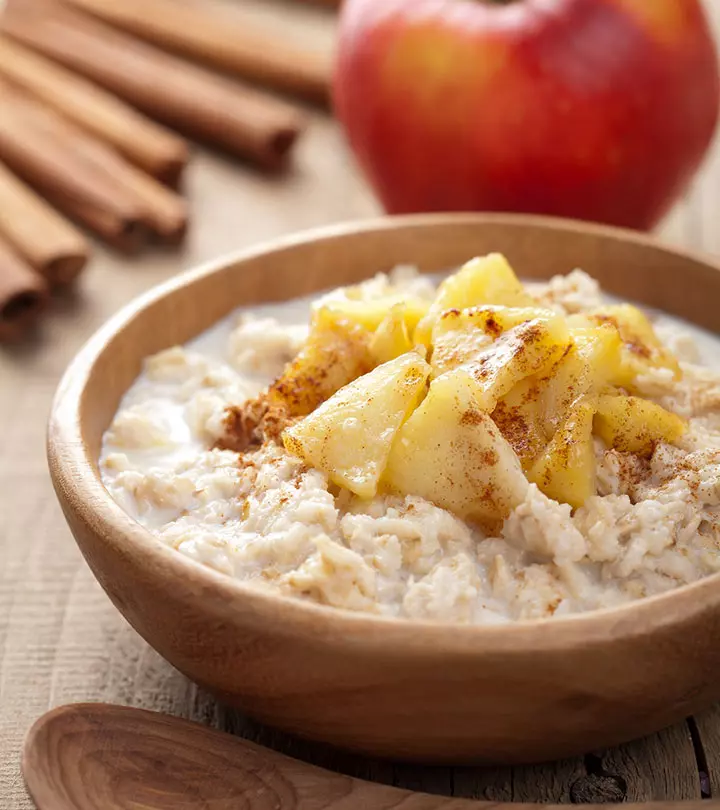
Image: Istock
Oatmeal has been the recent rage amongst all breakfast options! While popular for its convenience, versatility, and many health benefits, do you know that eating oatmeal is good for constipation as well? Along with being enriched with many vital vitamins and minerals, oatmeal is an important source of dietary fiber. It adds bulk to the stool and helps promote regular bowel movements (1). This makes it good for your heart and digestive metabolism as well. To know how oatmeal can get things going for you, read on!

 Know Your Ingredient: Oatmeal
Know Your Ingredient: OatmealWhat Is It?
Oatmeal is a composition of hulled grains that are either steel-cut or rolled.
What Are Its Benefits?
Oatmeal is rich in insoluble fiber that aids digestion and bowel movements
Who Can Consume It?
People suffering from constipation or anyone looking for healthy breakfast options.
How Often?
Cooked oatmeal can be consumed for every breakfast daily.
Caution
Although instant oatmeal contains laxatives, it is overprocessed and does not keep you full for long, making it less than healthy.
In This Article
Oats – A Brief
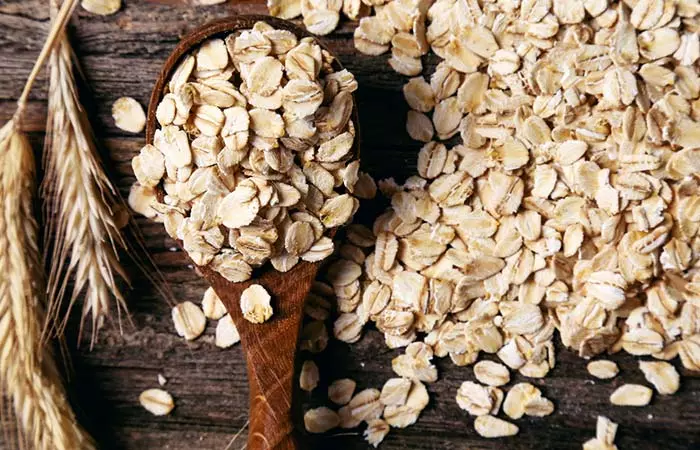
Scientific Name – Avena sativa
Origin – East Europe
Other Names – Jai (Hindi), Javie (Punjabi), and Joi (Bengali)
The world’s greatest breakfast. A food for the greatest. These are only a few of the phrases associated with this amazing food grain.
What makes this grain so special?
Oatmeal is the American name of the hulled oat grains that are either cut, rolled or ground to make this power-packed breakfast meal. It is a whole grain, whose glycemic response changes when it is ground. A type that is full of essential nutrients like iron, magnesium, manganese, selenium, B vitamins, and fiber.
This grain, whether steel-cut or rolled, is credited with a number of health benefits, including improved digestive health, lowered blood pressure, enhanced cardiovascular health, and the prevention of cancer and type II diabetes (2).
Apart from all of these, oatmeal can also make your bowel movements better. Let’s proceed to the next section to find out how!
Key Takeaways
- Oats contain high fiber, which helps regulate bowel movements and adds bulk to your stool.
- Oats help prevent type 2 diabetes and improve heart health.
- People with diabetes should avoid instant oats due to their high artificial sugar content.
- Drink lots of water and exercise regularly to regulate your bowel movements.
Why Is Oatmeal Good For Constipation?

It is not without reason that medical experts and diet specialists ask people suffering from constipation to have oatmeal.
Why oatmeal, though?
Oatmeal contains a good amount of insoluble fiber (3). This aids the digestion process. The fiber present in oatmeal aids bowel movements and soaks water from the fluids you drink. As a result, any chances of hard and dry stool formation are nearly eliminated. The fiber adds bulk to your stool and enables it to pass through the colon easily.
But does oatmeal make you poop?
On an average, a cup of regular oatmeal contains about 5 grams of fiber. This comprises soluble fiber that lowers cholesterol and insoluble fiber that aids digestion and bowel movements. While you get fiber from some fruits and vegetables, eating oatmeal is a good way to fulfill a significant part of the daily fiber intake. Fiber-rich foods are also good for cardiac health.
So, all in all, oatmeal relieves constipation and also aids better health in various other ways. It is easy to digest and full of vital nutrients that your body requires.
But picking the right variety of oatmeal is also essential to get instant relief from constipation. Read on to know how oatmeal helps with constipation
While oatmeal can help treat a common digestive condition like constipation, what effect does it have on irritable bowel syndrome? Continue reading to know.
Oatmeal For Irritable Bowel Syndrome
Oatmeal is often recommended for individuals with irritable bowel syndrome (IBS) due to its soluble fiber content. The soluble fiber in oatmeal helps regulate bowel movements and can ease symptoms of IBS, such as constipation. Oats contain a type of fiber called beta-glucan that forms a gel-like substance in the digestive tract and softens stools to promote regularity.
Additionally, oatmeal is easily digestible and is less likely to irritate the digestive system (4). However, it is important to choose plain, unflavored oats, as some artificial additives and sugars can trigger IBS symptoms in some people.
As we have seen, picking the right variety of oatmeal is essential to get instant relief from constipation. Read on to know how oatmeal helps with constipation.
Choosing The Right Type Of Oatmeal To Relieve Constipation
Oatmeal will relieve constipation and impart several health benefits. But, it is important you choose the right type of oats. The huge variety available in the market can leave you baffled. Explore the options and compare them to pick the most appropriate variant. Keep in mind, however, that any pack of oats you buy has surely undergone some processing.
1. Steel-Cut Oats
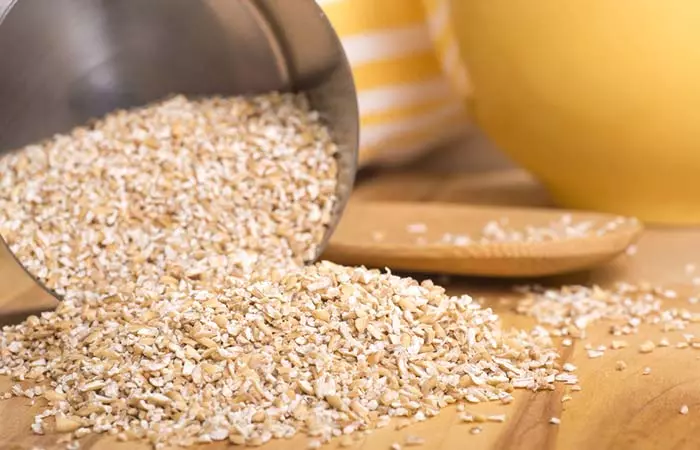
Steel-cut oats, also known as Irish oatmeal, are made with whole grain kernels. The manufacturers use sharp steel blades to cut the whole grain kernels. A favorite amongst dietitians for its immense health benefits.
Advantages
- This type of oats has a low glycemic index. As a result, it increases the blood sugar levels at a slower pace.
- You can stay full for longer and also experience better digestion and bowel movement. People love steel-cut oats for their delicious flavor, taste, and texture.
- The best part is that you need to have exactly half the amount as the other two varieties to get the same amount of fiber.
Disadvantages
- They take a while to cook, approximately twice the time we need to cook instant oatmeal. The health advantages are worth it, though. Also, cooking them overnight in a thermos or crockpot can serve as a shortcut method.
- Can be a little bland. To enhance the flavor and taste of traditionally prepared oats, you can add some cinnamon or cloves (help lower blood sugar) and honey (for its antioxidant benefits). Refrain from using any artificial flavor or sweetener. You may add some peanut butter or a dash of coconut or chocolate at times.
Bottom Line –
Go for it. The steel-cut variety is definitely a keeper for those who often suffer from constipation.
Tip: For those who have access to steel-cut oatmeal, but do not have time to cook it every day, here’s a solution. You can cook the oats on Sunday night in large amounts. Store the cooked oatmeal in the refrigerator and reheat it for the next few days.
2. Old-Fashioned Oats
These oats are made by the age-old steaming and rolling technique.
Advantages
- They are easy to cook and also have low glycemic index.
- They contain good amounts of fiber too, thereby aiding better digestion. Also, they do not have artificial flavors added.
Disadvantages
They are amazing but fall a little short when compared to the steel-cut variety.
Bottom Line – The second best choice in the list. Go for old-fashioned oats if you can’t find the steel-cut ones.
3. Instant Oatmeal
The convenience of instant oatmeal is undeniable.
A lot of people opt for instant oatmeal variants, especially those leading hectic lives or parents who have finicky kids suffering from constipation.
Advantages
Cheap, easy to make, and easily available at every supermarket.
Disadvantages
- Diet experts say these variants are less suitable from an overall health perspective.
- They are partially cooked and may contain additives like sugar, salt, etc.
- Instant oatmeal gets dissolved faster, and this makes it high in glycemic index (5). Nutritionists say that foods high in glycemic index cause a surge in the blood sugar levels, which is followed by a dip.
- This oatmeal variant does not keep you full for long though it acts as a laxativei Property of a substance or a medication of increasing bowel movements and relieving or preventing constipation. agent.
Bottom Line –
Do not use instant oatmeal if you want relief from constipation.
Sometimes, finding traditionally prepared oatmeal can be difficult. In most regions, instant oatmeal brands flood the market. If you cannot find traditional or steel-cut oats, do not lose heart. You can make this variety fit to cure constipation by following some steps. Take a look:
- It is possible to lower the glycemic index of instant oats by adding full-fat milk while preparing. Research has shown the benefits of consuming full-fat dairy over skimmed variants (6).
- You can also make up for the lack of fiber in instant oatmeal variants. Add some fiber-rich fruits, such as bananas and berries, to the oatmeal before serving. This will also make the dish tastier.
- Take a glance at the food label and see if sugar is added. As it is, oatmeal makers may add sugar in the forms of maple syrup, brown sugar, and corn syrup in their products. They enhance the taste but lessen the health benefits to a considerable extent.
You can also make old-fashioned oatmeal. Here’s how.
How To Make Oatmeal For Constipation Relief
Here’s a small and easy recipe to make the old-fashioned oatmeal:
You Will Need
- 1/2 cup old-fashioned oats
- 1 cup milk
- 1/4 teaspoon salt
- 1 tablespoon butter (unsalted)
- Toppings of your choice
What You Need To Do
- Take a small saucepan and add all the ingredients to it (apart from the toppings, of course!).
- Cook slowly on medium flame. Don’t forget to stir the mixture at intervals.
- Bring it to a boil. Take a spatula and check if the mixture has softened or not with it.
- Cook till the mixture looks creamy and thick. Add more milk or water if you desire a thinner meal.
- Transfer the mixture to a bowl and top it with berries and fruits of your choice. You can add ground spices too if you want.
- Your tasty and healthy oatmeal is ready! Eat while it is hot.
 Quick Tip
Quick TipMerely knowing how to make oatmeal isn’t enough. You also need to know the right way to do so so that you derive the maximum benefits. Read on to know more.
Constipation Woes – How To Make Oatmeal The Right Way
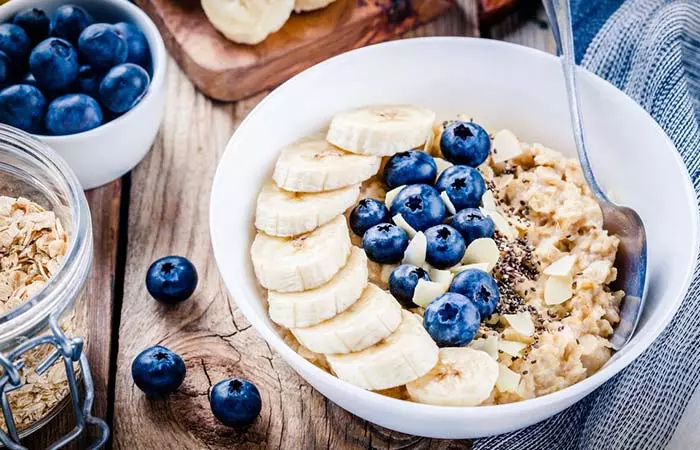
It is important that you prepare oatmeal the right way to preserve its nutrition and ease constipation. Listed below are a few handy tips:
- Quantity Is The Key – To make oatmeal enjoyable and easy to digest, use the right amount of water or milk. For steel-cut oats, use a cup of water to cook 1/4 cup of oats. For instant oats, using 1 cup of water for half cup oats should be fine.
- Experiment With The Base – At times, you might want to explore different options to make the oatmeal tastier, especially when giving it to kids. You can use non-dairy beverages, such as coconut milk, to add variety and a unique flavor profile. Some people also pour in apple cider vinegar.
- Avoid The Milky Mess – While making oatmeal with milk, some people end up creating a sticky mess. To avoid it, add some water to the pan. Heat it and add oats. After a while, pour some milk and add seasonings to it to make it smooth and creamy.
- Fruits And Nuts? Why Not! – If your kids love nuts, you may add some chopped fresh nuts to the oatmeal to add to its taste and nutrient quotient. Get experimental and add frozen berries, dried fruits, sliced fruits, coconut flakes and toasted nuts. You can also use a small amount of applesauce. Your kids will surely not complain about the lack of flavor or taste. It is a good idea to roast or grind herbs like cinnamon and cardamom and sprinkle them on top of oats before serving.
- Do Not Rush – Do not cook oatmeal, either with water or milk, on a high flame. The oats at the bottom of the bowl will get burnt, and dishwashing will be a pain.
You will find plenty of recipes online to prepare oats in numerous ways. Some people use it instead of refined flour to make cakes. Just search the web for such innovative oat recipes. You will be amazed at the number of recipes and possibilities. So, what are you waiting for? Try your own version of oatmeal today!
 Quick Tip
Quick TipWho Can Eat Oatmeal To Get Rid Of Constipation?
Apart from infants who have not started taking solid or semi-solid foods and people who are allergic to oats, nearly everyone can eat oatmeal.
1. Infants
Infants can also develop constipation at times. This happens mostly when you introduce them to solid foods. An infant used to breast milk and a liquid diet can develop constipation when solid foods are suddenly introduced in his or her meals. Solid foods are hard to digest for an infant’s stomach. However, some pediatricians feel that it is better to feed babies oatmeal instead of rice cereal since the former adds bulk to the babies’ diet.
2. Kids And Teens
Teens often suffer from constipation. Their preference for junk foods, irregular eating cycles, and lack of fluid intake make them constipated.
You can give oatmeal to a kid or teen suffering from constipation. You can prepare oats using the shortcut methods listed above.
3. Adults
Adults can develop constipation for a number of reasons. They can include oatmeal in their breakfast or have it at other times of the day to ease constipation.
An online survey conducted on a sample of American adults, which included 16,053 respondents, found that 4,702 participants, or 24.0% of the total respondents, had experienced constipation. Among those who reported previous constipation, 37.6% had discussed their symptoms with a healthcare professional. In terms of managing their constipation, 47.8% of the respondents indicated that they were taking medication.
4. Pregnant Women

Pregnancy induces a lot of physiological changes in the human body. Apart from weight gain and mood swings, a pregnant woman can also suffer from constipation at times. This is due to the excessive secretion of progesterone, which makes the digestive tract muscles more relaxed. The pressure of the fetus increases on the rectum as well and, as a result, the bowel movement slows down. Some women take iron supplements during pregnancy, which hardens the bowel and leads to constipation. These women should eat oatmeal for a hassle-free bowel movement (5).
5. Elders
A lot of elderly women and men develop digestive problems and suffer from constipation. Having oatmeal is an easy and suitable way to ease their discomfort. It also adds a nutrient-rich food source to their diet.
So, now you know why is oatmeal good for constipation, let’s see about its effects.
A Word Of Caution
In general, oatmeal is deemed safe for consumption, even during pregnancy – owing to its ease of digestion and plethora of nutrients. However, you need to be cautious about a few aspects.
- Those who have diabetes should avoid instant oats and flavored oatmeal variants. These products may contain added sugar, artificial sugars, and flavors.
- Oatmeal should be cooked well to maximize the digestive benefits. It is ironical that oatmeal, which relieves constipation, can lead to constipation if not prepared properly.
- At times, oatmeal is harvested in fields that are near wheat and barley crops. This increases the risk of oats getting contaminated with gluten. Individuals with celiac diseasei Immune reaction to the consumption of gluten (a chemical compound found in wheat, barley, and rye) that causes damage to the small intestine. and non-celiac gluten sensitivity should purchase certified gluten-free oats. Gluten contamination may also lead to allergic responses in some people and can affect babies as well.
- Oats contain purinesi Chemical compounds in the body and food that need to be consumed in moderation as an excess can lead to gout. that can lead to kidney stone development in some instances. So, people with kidney stones or gout can enjoy oatmeal in moderate quantities. They should opt for other high-fiber foods to ease constipation.
- If you do not consume much fiber, add oats gradually to your diet, as too much fiber may lead to discomfort, bloating, and gas (7).
Eating oatmeal, whether it is steel-cut or traditionally made, will help you avoid constipation, but you also need to do something more to obtain the best results. Here are a few:
Other Ways To Limit Constipation Risk
- Fiber needs enough water to soak in, and this helps make the bowel movement easier. So, when you consume oatmeal daily, be sure to stay hydrated. Drink plenty of water and other healthy beverages to let the fiber in oats work as desired and maintain proper bowel regularity.
- Additionally, you should be physically active so that your digestive tract is stimulated to pass the bowel smoothly.
- Reduce intake of processed and high-fat foods, such as butter, cream, etc., which can contribute to constipation.
- Consider probiotics, such as yogurt, as they may help improve gut health and promote regularity (8).
Infographic: A Guide To Using Oatmeal To Help Relieve Constipation
Oatmeal is a versatile and easy-to-make breakfast option. It is loaded with essential B vitamins and dietary fiber, which promote better bowel movements and manage constipation. However, not choosing the right type of oatmeal or cooking it the right way may not help relieve your constipation. Check out the infographic to know more about the types of oats and simple tips to cook oatmeal the right way.
Some thing wrong with infographic shortcode. please verify shortcode syntaxOatmeal is a versatile and convenient food for breakfast. Oatmeal’s insoluble fiber and vital nutrient profile promote digestive wellness. There are various benefits of oatmeal for your overall health, reassuring steps towards a healthy life. But choosing the right type of oatmeal will make the difference. Hence, always check for the most appropriate variety and use the right amount of water or milk to reap its maximum benefits. People who have diabetes should avoid intake of instant oats as they contain added sugars. Also, individuals with kidney stones should consume them in moderation, as purines in oats may lead to kidney stone formation.
Frequently Asked Questions
Can oats be eaten raw?
Yes! Oats can be consumed raw. But it is not generally recommended, especially if you are constipated or have a weak digestive system. Roasting is an option. But if you want to eat them raw, progress slowly. Begin with a really small amount, and increase the quantity gradually. Having water or juice with raw oats will help lubricate the rough meal for better digestion.
Does oatmeal cause constipation?
Only if you go overboard with it. Oats are generally gut-friendly, but since they are laden with fiber, they can cause the opposite effect if taken in a large quantity over a large span of time. If a person has gluten intolerance, they may be prone to constipation. In a such a case, they should use only certified gluten-free oats.
How long after eating oatmeal will I poop?
Due to oatmeal’s high fiber content and the amount of oatmeal you have consumed, it can take any time between 2-4 hours.
Does oatmeal clean your colon?
Yes, oatmeal can ease digestion and cleanse your colon due to its high fiber and antioxidant content (9).
Is 1 cup of oatmeal a day too much?
No, 1 cup of oatmeal a day is an average serving amount and is considered safe for daily consumption.
Can oatmeal cause gas and bloating?
Since oatmeal is high in soluble fiber, it may lead to bloating and gas if not properly digested (10).
Illustration: Is Oatmeal Good For Constipation?

Image: Dall·E/StyleCraze Design Team
Looking for natural remedies for constipation? This video explores the potential of oatmeal in relieving constipation and enhancing bowel movements. Watch now.
References
Articles on StyleCraze are backed by verified information from peer-reviewed and academic research papers, reputed organizations, research institutions, and medical associations to ensure accuracy and relevance. Read our editorial policy to learn more.
- High fiber diet
https://www.ncbi.nlm.nih.gov/books/NBK559033/ - Potential health benefits of avenanthramides of oats
https://pubmed.ncbi.nlm.nih.gov/19941618/ - Mechanisms by which wheat bran and oat bran increase stool weight in humans
https://pubmed.ncbi.nlm.nih.gov/9734752/ - Systematic Review of the Effects of Oat Intake on Gastrointestinal Health
https://pubmed.ncbi.nlm.nih.gov/34486656/ - The role of meal viscosity and oat β-glucan characteristics in human appetite control: a randomized crossover trial
https://www.ncbi.nlm.nih.gov/pmc/articles/PMC4052334/ - Dairy Fats and Cardiovascular Disease: Do We Really Need to Be Concerned?
https://www.ncbi.nlm.nih.gov/pmc/articles/PMC5867544/ - Effects of High-Fiber Diets and Macronutrient Substitution on Bloating: Findings From the OmniHeart Trial
https://pmc.ncbi.nlm.nih.gov/articles/PMC7056053/ - Effectiveness of Probiotics in Patients With Constipation: A Systematic Review and Meta-Analysis
https://pmc.ncbi.nlm.nih.gov/articles/PMC10854359/ - Nutritional advantages of oats and opportunities for its processing as value added foods – a review
https://www.ncbi.nlm.nih.gov/pmc/articles/PMC4325078/ - Inhibitory actions of a high fibre diet on intestinal gas transit in healthy volunteers
https://www.ncbi.nlm.nih.gov/pmc/articles/PMC1774297/
Read full bio of Kathie Madonna Swift
Read full bio of Tanya Choudhary
Read full bio of Ravi Teja Tadimalla
Read full bio of Himanshi Mahajan







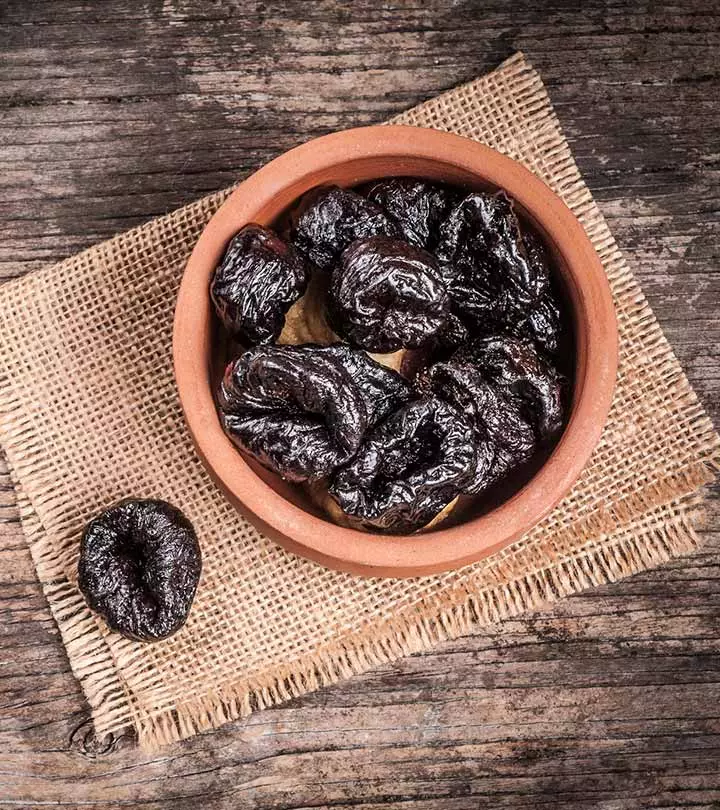





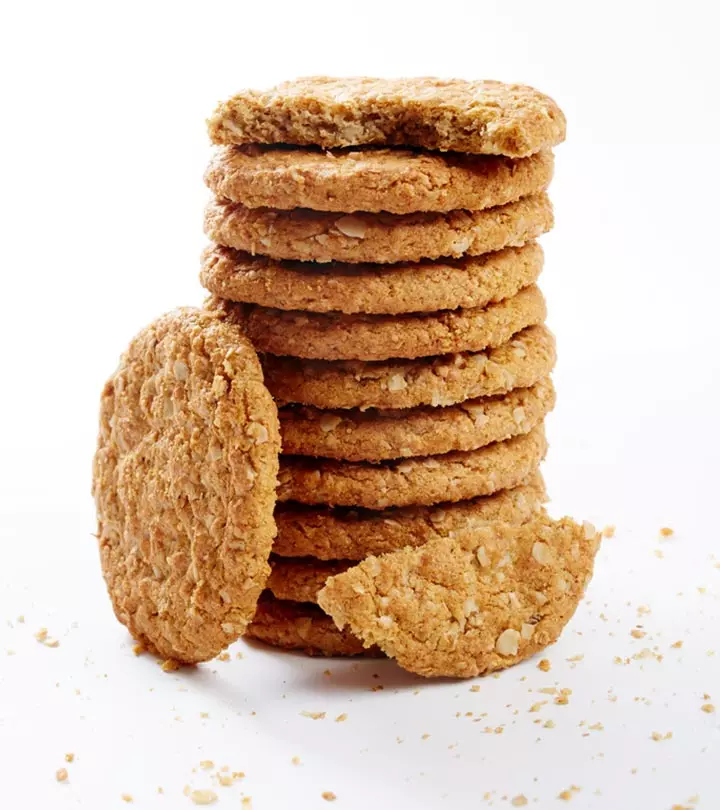



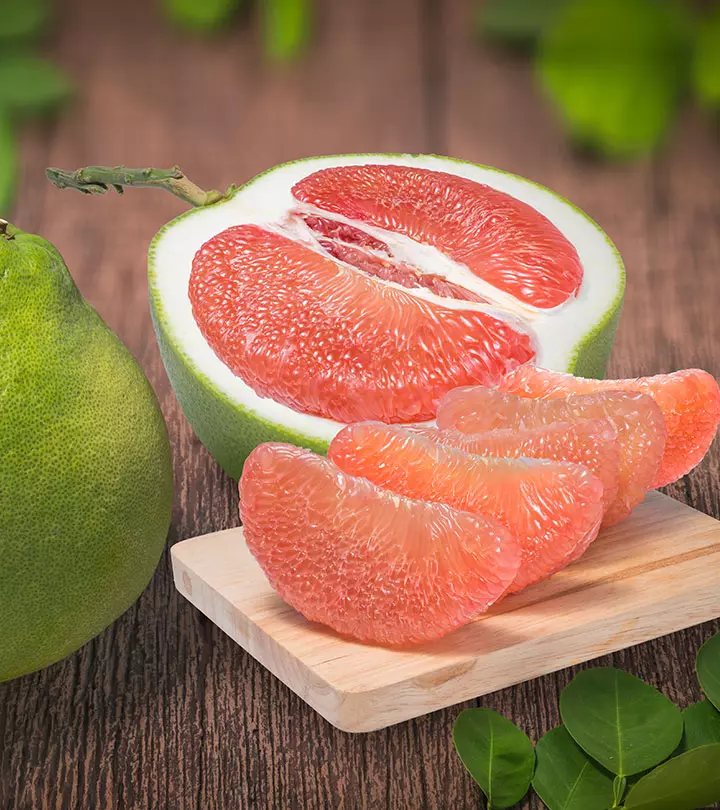
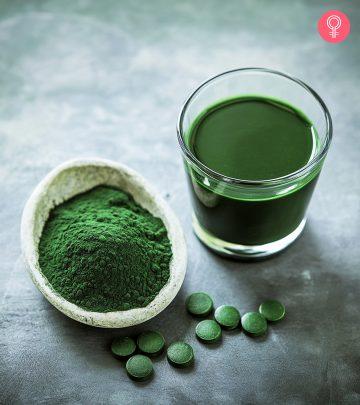
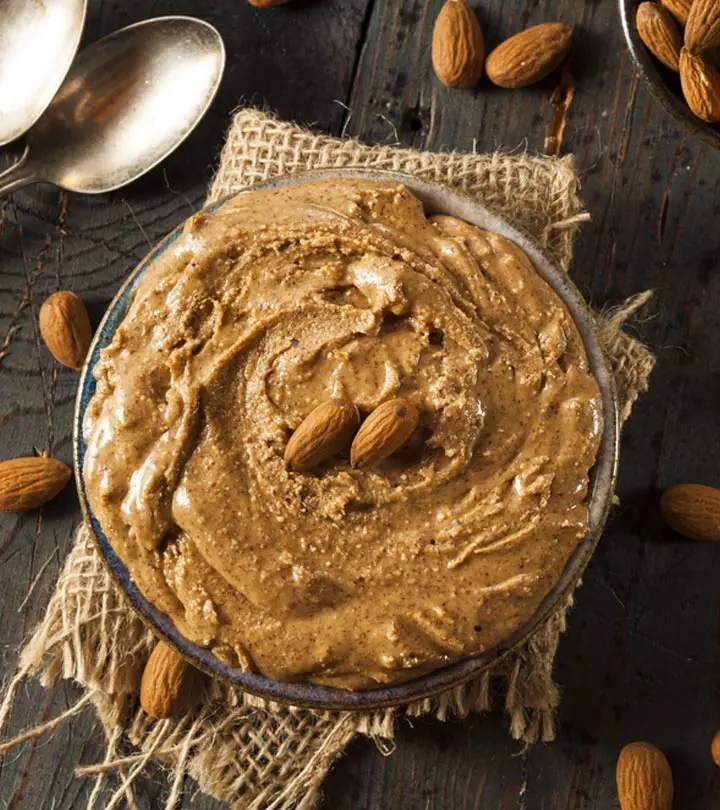







Community Experiences
Join the conversation and become a part of our empowering community! Share your stories, experiences, and insights to connect with other beauty, lifestyle, and health enthusiasts.